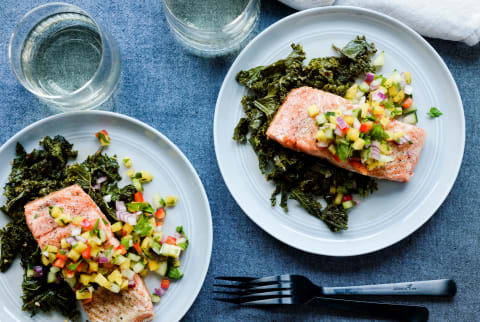Advertisement
Which Is The Best Blood-Sugar-Balancing Diet? The Definitive Ranking


Food can either feed disease or be your most powerful medicine. With so much conflicting information online about the best diets for your health, it is difficult to know where to start. While each person's specific health case is different, those with blood sugar problems can benefit more so from certain diets than others.
As a functional medicine practitioner, I see many people unknowingly contributing to their blood sugar problems through the foods they are eating on a daily basis. I've written in the past about the many so-called healthy foods that fuel insulin resistance and other metabolic health problems but never the best overall diet for controlling blood sugar. These are my favorite ways of eating that have been clinically shown to balance blood sugar:
1. Ketogenic Diet
The ketogenic diet is exploding in popularity in the wellness world, and for good reason. This diet focuses on a high-fat, moderate-protein, and low-carb mix of macronutrients to heal a variety of health problems including rebalancing out-of-control blood sugar—so much so, that in my functional medicine clinic, this is my gold standard for anyone looking to bring healing to their blood sugar problems.
Through transitioning your body from a sugar-burner to a fat-burner, you are no longer relying on glucose for energy and instead gain your energy from ketones, the by-products of fat burning. This is not only a more sustainable form of fuel for your body since you are no longer relying on glucose from high-fructose fruits, grains, and sugar, but this will also help bring your blood sugar levels back down to normal levels.
Multiple studies show the ketogenic diet's ability to lower insulin levels, reduce inflammation, and improve insulin receptor site sensitivity, which helps the body function the way it is designed. Research has even shown that symptoms of type 2 diabetes can be reversed after just 10 weeks on a ketogenic diet!
A ketogenic diet can be done alongside whatever diet you are currently doing since all you have to do is calculate your ratios and meal plan around the foods you are already eliminating and are allowed to eat. Even those who would like to avoid meat and dairy can still do a ketogenic diet doing a plant-based version of it.
2. Intermittent Fasting/Time-Restricted Feeding
Intermittent fasting or time-restricted feeding protocols are fantastic tools that can easily be incorporated into any particular diet you may be following. By limiting your food intake to certain windows of time, it gives your body time to rest with some amazing benefits. IF takes center stage for its ability to heal insulin resistance. In fact, multiple studies have linked intermittent fasting with increased metabolism and lower insulin resistance.
One study1 looked at three different patients of various ages, all diagnosed and taking medication for type 2 diabetes for over 10 years. All patients were required to eat a low-carb diet (think: ketogenic) in conjunction with three 24-hour fasts per week. By the end of the trial, not only did each patient lose weight, but they were able to completely discontinue their insulin medication.
There are many ways to intermittent fast depending on your experience with fasting and personal schedule. You can check out my article here for all of the ways to fast, but some of my favorites for each level include:
Beginners Intermittent Fasting: The 8-6 Window Plan
In this plan you eat only between the hours of 8 a.m. and 6 p.m., allowing for 14 hours of uninterrupted fasting.
Intermediate Intermittent Fasting: The 12-6 Window Plan
In this plan you extend the fasting period and only eat between the hours of 12 p.m. and 6 p.m. increasing your fasting time from 14 to 18 hours.
Advanced Intermittent Fasting: Every-Other-Day Plan
This plan is exactly as it sounds, with one day of eating followed by a full 24 hours of fasting.
Super Advanced Intermittent Fasting: OMAD
This is a 23:1 fasting to eating protocol, hence its name: OMAD (one meal a day). For a full run-down on OMAD, check out my article on the subject.
3. Paleo
For those just beginning their wellness journey, a paleo diet is the perfect starting point. It focuses on clean, whole food sources such as vegetables, fruit, meat, wild-caught fish, eggs, nuts and seeds, and healthy non-refined oils, while eliminating dairy, grains, processed foods and sugar, and legumes. By removing foods known to cause blood sugar spikes like grains, unnecessary sweeteners, and processed sugar, it can work to stabilize blood sugar levels.
In a study published in Cardiovascular Diabetology3, those following a paleo diet had significantly lowered glucose levels compared to those following a conventional diabetic diet. Comparatively, a traditional diabetic diet focuses more on the foods that a paleo diet eliminates—whole grains, dairy products, legumes, and root vegetables—and is lower in total fat.
4. AIP (Autoimmune Protocol)
Following the same principles of a paleo diet, it is slightly stricter by eliminating additional foods including eggs, nuts and seeds, and nightshade vegetables and spices. Since these foods can be immune stimulants for some people, those with autoimmune blood sugar problems like type 1 diabetes and type 1.5 diabetes, also known as LADA (Late Autoimmune Diabetes of Adulthood), can benefit from taking these out from their diet. While you aren't going to cure these autoimmune blood-sugar conditions, the more stable your immune system is the more stable your blood sugar can be.
While studies are limited on the effects of an AIP diet on blood sugar specifically, since you are also removing the same foods in a paleo diet, like grains and sugar, that can contribute to blood sugar spikes, logic would conclude that this diet would be beneficial as well, with the addition of these various immune stimulants, especially if for blood sugar problems that have an autoimmune component to them.
Of course, other diets can work to balance blood sugar, but in my practice, these are my top four—and with them, my patients see real results!

Will Cole, IFMCP, DNM, D.C., is a leading functional medicine expert who consults people around the globe, starting one of the first functional medicine telehealth centers in the world. Named one of the top 50 functional and integrative doctors in the nation, Dr. Will Cole provides a functional medicine approach for thyroid issues, autoimmune conditions, hormonal imbalances, digestive disorders, and brain problems. He is the host of the popular The Art Of Being Well podcast and the New York Times bestselling author of Intuitive Fasting, Ketotarian,The Inflammation Spectrum, and Gut Feelings.
More from the author:
Functional Nutrition Training
Check out Functional Nutrition Coaching
A cutting-edge nutrition deep dive taught by 20+ top health & wellness experts
Learn moreMore from the author:
Functional Nutrition Training
Check out Functional Nutrition Coaching
A cutting-edge nutrition deep dive taught by 20+ top health & wellness experts
Learn more
Will Cole, IFMCP, DNM, D.C., is a leading functional medicine expert who consults people around the globe, starting one of the first functional medicine telehealth centers in the world. Named one of the top 50 functional and integrative doctors in the nation, Dr. Will Cole provides a functional medicine approach for thyroid issues, autoimmune conditions, hormonal imbalances, digestive disorders, and brain problems. He is the host of the popular The Art Of Being Well podcast and the New York Times bestselling author of Intuitive Fasting, Ketotarian,The Inflammation Spectrum, and Gut Feelings.